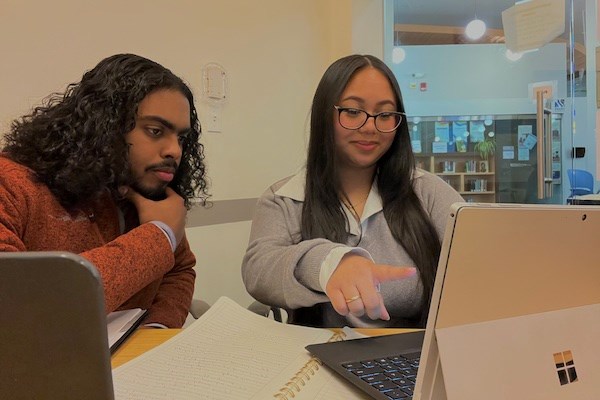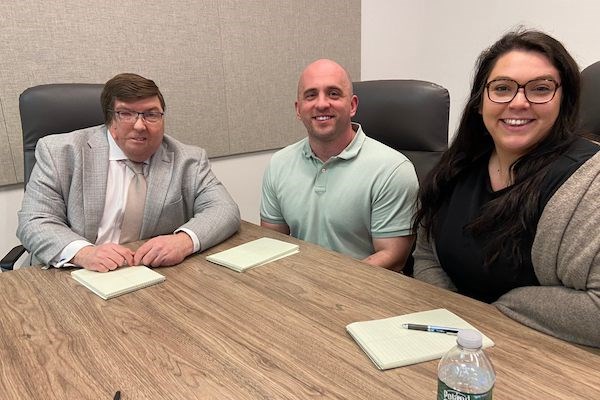Community Assessment to Identify Needs to Help Residents Overcome Substance Use Disorders

04/17/2024
By Karen Angelo
Determined to combat substance use disorders among community members, the town of Billerica turned to UMass Lowell’s Department of Public Health for help.
“Since we already have resources in place to help people and their families who suffer with substance use disorders, we wanted to make sure that we’re spending money on programs that would further make a difference to people’s lives,” says Billerica Town Manager John Curran.
Billerica is one of 338 Massachusetts towns and cities receiving funds from statewide opioid-related lawsuit settlements. Money from the settlements with opioid distributors and manufacturers must be used on substance use disorder prevention, treatment and recovery programs. Billerica has received about $171,000 to date and will continue to receive funds from the settlements for the next 18 years. Billerica Assistant Town Manager Clancy Main ’13, ’16 received advice from the Massachusetts Department of Public Health that the town should conduct an analysis of what’s needed by gathering input from residents.
“I knew that UMass Lowell had a public health department, so I reached out and talked with [Assoc. Prof.] Lee Ackerson, who was extremely helpful,” says Main, who earned a Master of Public Administration and bachelor’s degree in political science from UMass Lowell.

“This project highlights the best of collaboration and Billerica’s shrewd investment of public resources,” says Ackerson. “The best way to find solutions that will help is to conduct a community assessment, which means collecting feedback from people who suffer with substance use disorders and their families, as well as from anyone who is touched by the opioid epidemic.”
Since 2014, Billerica has provided services to stem overdoses and promote prevention, including a response team that visits people who have overdosed, provides recovery resources and facilitates access to treatment. The Billerica Substance Awareness and Prevention Committee worked with schools to integrate drug prevention curriculum in classes for grades 9 to 12.
Initial data collected by the project team shows that these efforts appear to be working. Overdose deaths in Billerica decreased by 56% in 2022 after record highs in 2016. In comparison, overall deaths due to opioid overdoses in Massachusetts have increased by 10% and decreased by 6.5% in Middlesex County during the same timeframe.
"I'm excited to see the results of the analysis to bring the focus to areas where we need to increase resources,” says Select Board Vice-Chair Dina Favreau, who is also chair of the Billerica Substance Awareness and Prevention Committee.
“Billerica has been working toward solutions for a very long time, but we still need to stay on top of this as the crisis evolves. Services that include the gold standard are the goal and should include inclusive and accessible options for young people, women, women with children as well as for family support. I will be relieved once we can finally put this money to use."
Ackerson, who teaches an undergraduate community health assessment course, took full advantage of this real-life teaching opportunity. Working with Consentino, students interviewed representatives from the public schools and police department, as well as other municipal officials. Consentino interviewed Billerica residents who were actively using substances, in recovery or had a family member impacted by the opioid crisis.
“We’re fortunate to have UMass Lowell’s expertise in public health in our backyard to build a plan for the coming years that will save lives.” -Billerica Asst. Town Manager Clancy Main ’13, ’16“The students did a great job interviewing and compiling the feedback, and now we’re at the stage where we are collecting more information via a survey from residents,” says Consentino, who started EpiPath Consulting during the COVID-19 pandemic to guide local public health departments and community-based organizations on research development, data collection and analysis and grant writing.
The project helped public health major Melissa Sin ’24 better understand the complexity of addressing societal issues.
“The topics covered in my public health courses proved instrumental in allowing me to grasp Mr. Curran's perspective on addressing issues related to substance use disorders and the steps taken by him and his team,” says Sin, a public health major from Lowell. “This experience has shaped my understanding of effective interviewing techniques, including how to elicit valuable information from interviewees and maintain a professional demeanor throughout the process.”
For Manasés E. Jiminian ’25, working on the Billerica experience struck close to home. He works part time for Drug-Free Communities in Lawrence, a federally funded program, to prevent youth substance and alcohol use disorders in his hometown.
“This project helped me better understand how data and feedback can help find solutions that work for certain groups of people who are in need,” says Jiminian, who plans to pursue a Master of Public Health in Epidemiology once he graduates; he ultimately wants to attend medical school. “My end goal is to serve underrepresented people and make sure that I can be the best at my profession.”
After the survey results come in and the town hosts in-person listening sessions, Consentino will compile a report with recommendations and present it at public meetings.
“We’re fortunate to have UMass Lowell’s expertise in public health in our backyard to build a plan for the coming years that will save lives,” says Main.
